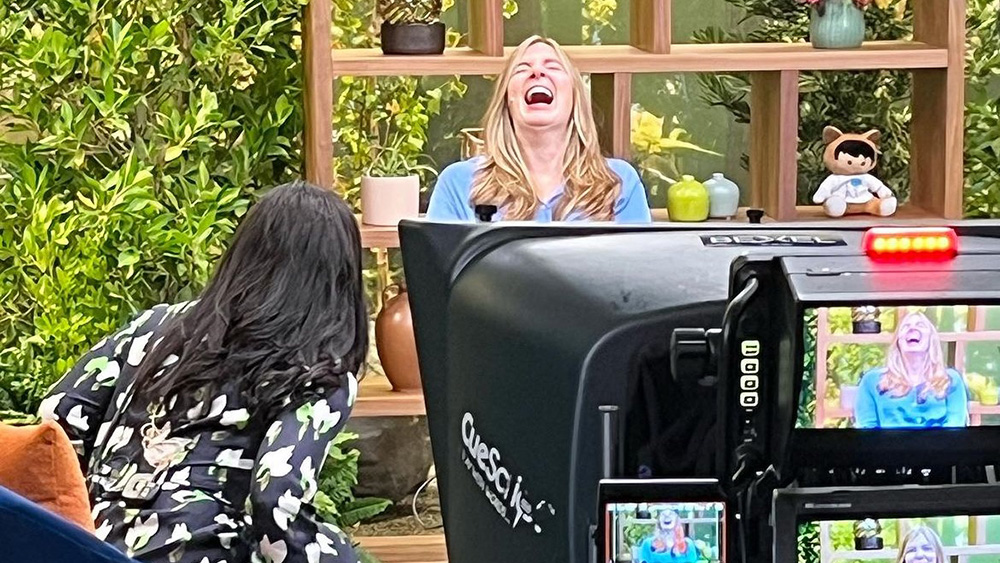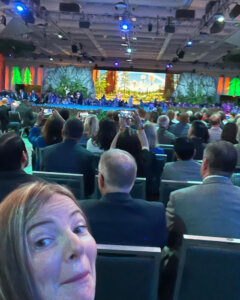
Salesforce’s Brooke Eby, on stage at Dreamforce, uses humor and social media to share the story of her ALS diagnosis at 33.
After Brooke Eby was diagnosed in March of 2022 with ALS (amyotrophic lateral sclerosis), a terminal disease for which there currently is no cure, the then-33-year-old spent a few weeks crying, she said in an Instagram video, and eating party-sized bags of M&Ms. But a “switch flipped” after Eby, who was using a walker, “hobbled” in as a bridesmaid for her friend’s wedding — panicked, she recalled, at the thought of what everyone was thinking of her. Encouraged by friends, by the end of the evening, she was giving other guests rides on her walker all over the dance floor. It was a huge mental shift, Eby said on Instagram. “I thought that if we can laugh about it here, then maybe I can be comfortable enough to get before more people and share my story about what I am going through on social media.”
She wanted to talk to a wide audience about the disease, Eby told Convene, because “I don’t think people know enough about ALS — especially the fact that it can affect a younger person. That was news to me when I got diagnosed.” The nervous system disease, which weakens muscles and has an impact on physical function, isn’t as rare as people may think — it affects approximately one in 300 people in the United States — and isn’t always genetic, said Eby, who is a partnership principal at Salesforce. “No one in my family has it. It struck out of the blue for me.” She decided, she said, “to start sharing in the hope that people were interested in learning more and, ideally, to become involved as some sort of an advocate.”
To say that she has succeeded would be an understatement. Since shortly after her diagnosis, Eby has posted hundreds of videos on Instagram and TikTok, sharing the details of her life as she navigates the disease, infusing even the most difficult or potentially embarrassing topics with candor and humor. She answers questions about relationships, takes viewers behind the scenes on doctor visits and business trips, and interviews family and friends, sometimes wielding a lighter as a microphone. Eby also talks about ALS while putting on makeup, a decision driven not because she wants to do makeup tutorials, she said, but by the fact that it often is the only time she can find to create content.

Brooke Eby’s remarks at a Salesforce meeting that gathered the company’s top executives together last summer resulted in pledges of half a million dollars for ALS research.
Levity as a Superpower
Eby essentially works two jobs: for Salesforce by day, and after hours, creating and posting content about her life with ALS, for TikTok and Instagram and educating audiences about ALS in dozens of media and podcast interviews. Eby often is asked, she said, why she has continued to work for Salesforce after her diagnosis — the average length of time that people with ALS live after diagnosis is two to five years. One answer is that while the disease progresses rapidly in some people, there are others, like physicist Stephen Hawking, who live for decades with the disease. Eby went from using a walker to a wheelchair in the year following her diagnosis, but so far, the disease is limited to her legs, she said. Another answer is that as a remote worker for Salesforce, her job is “additive,” she told Convene, allowing her to not only continue to lead a normal life but to greatly increase the visibility and impact of her advocacy for ALS.
Her professional and personal lives began to come together in 2023 after members of her team noticed the videos she posted daily to raise money — her nieces held a lemonade stand — during ALS Awareness Month last May. Colleagues came to her saying that they wanted to support her efforts, Eby said, and not long after, a PowerPoint slide popped up during a team meeting introducing the Levity Project, a fundraising initiative that allowed employees to log hours of movement in exchange for company donations. That same month, a producer for NBC’s “Today” show noticed her social-media posts and Eby later made an appearance on the pro- gram, where she talked about her desire to use humor to connect with people. “Levity,” she told co-anchor Savannah Guthrie, “is my superpower.”
At Salesforce, the launch of the Levity Project was “really when our executive team started taking notice,” Eby said. She was invited to speak last summer about ALS at an internal company meeting that gathered 600 top Salesforce executives in person and was streamed to 70,000 more employees online. She was interviewed for 20 minutes at the meeting, which “was terrifying because I was sitting literally right in front of our CEO and cofounders,” Eby said. But by the end of interview, the executives in the room had pledged $500,000 for ALS research via texts to one another.
In September, Eby returned to the stage at Salesforce’s Dreamforce conference, where she talked about living and working with ALS with broadcast journalist Soledad O’Brien. More recently, Eby was featured on Salesforce’s company social-media accounts during Giving Tuesday, where, from her kitchen, she talked about the ALS Association, which funds patient care and research. Eby’s willingness to share the reality of her life with ALS — combined with Salesforce’s size and commitment — have helped her raise nearly $1 million for ALS research.
ALS has forced her to adjust a lot of her life, “but luckily, Salesforce has adjusted with me,” she told O’Brien at Dreamforce. And, she told Convene, Salesforce “not only supports me as an employee, but they’re giving me a platform to speak to a huge audience and to raise a ton of money that I’d never be able to raise without an ecosystem like this. I’m getting access to people who can really make a difference… who can really spread the word more than some girl living in Maryland.”
‘Part of Our Repertoire’
Elle Potruch is a talent manager who represents Deaf and disabled clients for social-media company Whalar.
Most of her clients — ALS education advocate Brooke Eby is one — use social-media platforms like Instagram and TikTok to tell their stories, said Potruch, who is disabled. “A lot of the folks that we work with have a really strong voice. They have a really good idea about what they want to say.” Among the services she provides clients is insight on social-media algorithms, which are always changing, Potruch said. “We’re constantly learning and adapting, and I think that’s where disabled people have a huge leg up — we’ve always been adapting to everything. Everything. So learning and adapting is part of our repertoire.”
Barbara Palmer is deputy editor of Convene. Ascent is supported by the PCMA Foundation.
